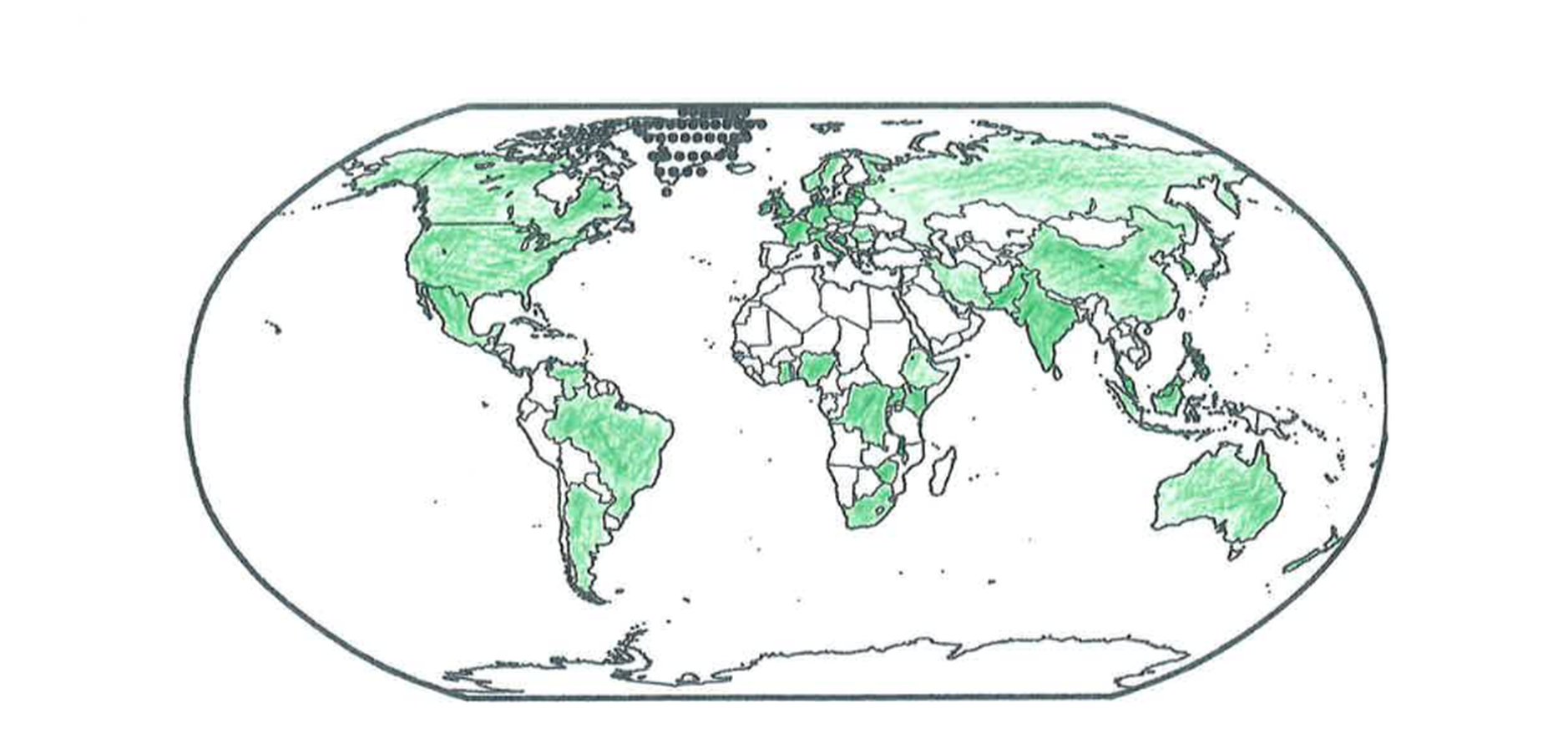Report indicates the global nature of parishes in the United Dioceses
Chart above – The green shaded areas on the map of the world indicate how globalised Dublin & Glendalough have become in the last 15 years.
A new report looking at cultural and ethnic diversity in the parishes of the United Dioceses of Dublin & Glendalough was presented to members of Diocesan Synod recently. ‘But the Lord looks on the heart’ was compiled and written by the Revd Prof Anne Lodge who conducted a survey of incumbents in Dublin & Glendalough in summer 2020.
The survey had a response rate of over 60% and Prof Lodge thanked all who took the time to respond.
Presenting her report to Synod, which took place on Zoom, Prof Lodge noted that during 2020 attention was drawn internationally and at home to the ongoing scourge of racism. She said this seemed a good time to update work that was done in 2005 when a diocesan committee produced the ‘Welcoming Angels’ report. This report indicated globalisation had come to the Church of Ireland in Dublin & Glendalough and shared advice about how to welcome and support newcomers in our congregations.
The 2020 report indicates the global nature of parishes in the United Dioceses with congregations including people from north and south America, across Asia, the Middle East, Africa and across Europe. Some churches have long standing and more recent arrangements to share space with congregations of Christians who are in communion with the Church of Ireland.
In the survey clergy were asked to identify the blessings that globalisation had brought to their parishes. Prof Lodge reported a broad range of responses which she detailed under two headings: broadened perspectives and outlooks; and the great variety of blessings in serving God and the community.
Prof Lodge said that incumbents were also asked to identify any challenges that had emerged and said that sometimes there could be discomfort and fear of change among longstanding members of the congregation which they had to manage carefully. There were a handful of occasions when such discomfort went further into racist distrust or lack of respect. Clergy dealing with these types of incidents reported learning to challenge the incidents rather than sweeping them under the carpet, she stated.
The report outlines three key areas shared by clergy through their experience: the benefit of engaging new parishioners and finding ways to recognise the diversity of cultures and languages; the importance of including people from across the range of the congregation in leadership and support roles in the parish; and the benefit of organising social and cultural events to foster friendships and sharing of cultures.
Incumbents also had advice for the dioceses and hoped that the diocesan website and magazine could be used to share the diverse stories of global and local parishioners.
“Incumbents were keen that both informal and formal mechanisms be found at diocesan level to diversify representation to reflect current realities. They were also keen that the diocese create spaces to explore diversity of worship that is properly Anglican but that also reflects the multi–cultural reality of our Church of Ireland in Dublin and Glendalough,” Prof Lodge reported adding: “Incumbents were keen that those in leadership positions in the United Dioceses would preach prophetically against racism, intolerance and disrespect both in Church and in the wider society. They also hoped people in leadership roles would lead by example.”
The report contains eight recommendations:
1. Engage with laity to ensure a range of voices is heard.
2. Establish a working group to share expertise for the benefit of all.
3. Collate four Bible studies for use with parish groups.
4. Appoint a diocesan advisor for cultural and ethnicity welcome and inclusion.
5. Explore ways in which people’s voices and stories can be shared beyond individual parishes.
6. Explore ways of broadening formal representation at diocesan level.
7. Document good practice around sharing churches with congregations in communion with the Church of Ireland
8. Conduct an audit of statues and monuments in churches in Dublin & Glendalough to ascertain whether such monuments connected to the slave trade can be found in any parish churches. Should they be found, Prof Lodge recommended that there be an option of having a simple explanatory notice put up in the relevant church about that monument.
You can access Prof Lodge’s presentation or view the short video played at Diocesan Synod through links on the diocesan web site at –
[[] https://dublin.anglican.org/news/2020/11/02/new-report-highlights-cultural-and ]
Dublin-map.jpg



